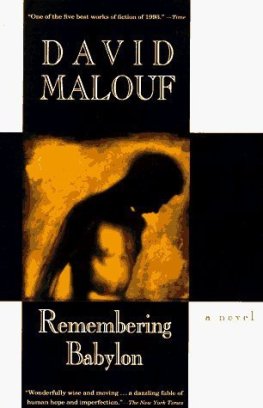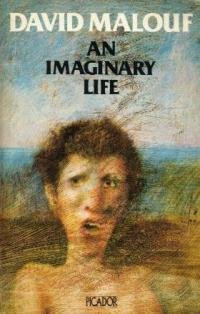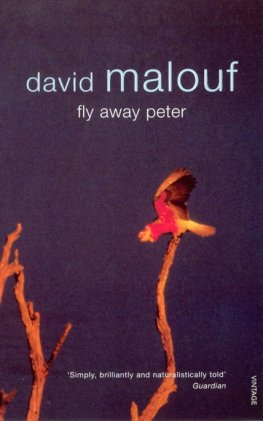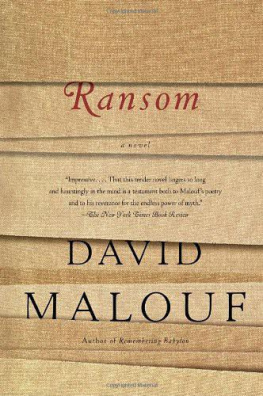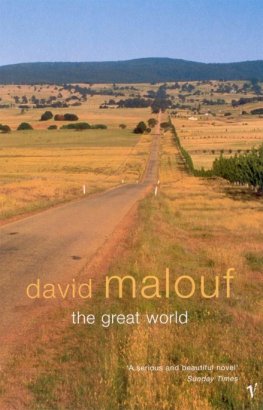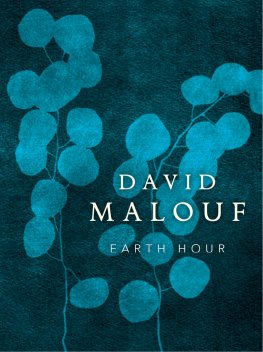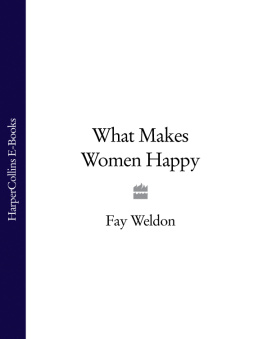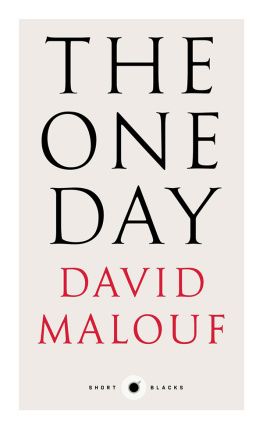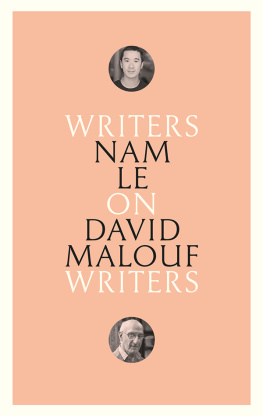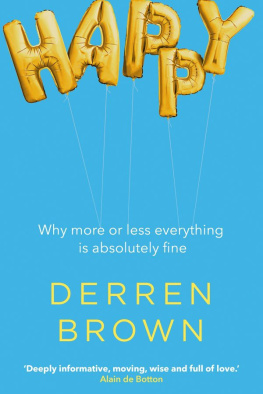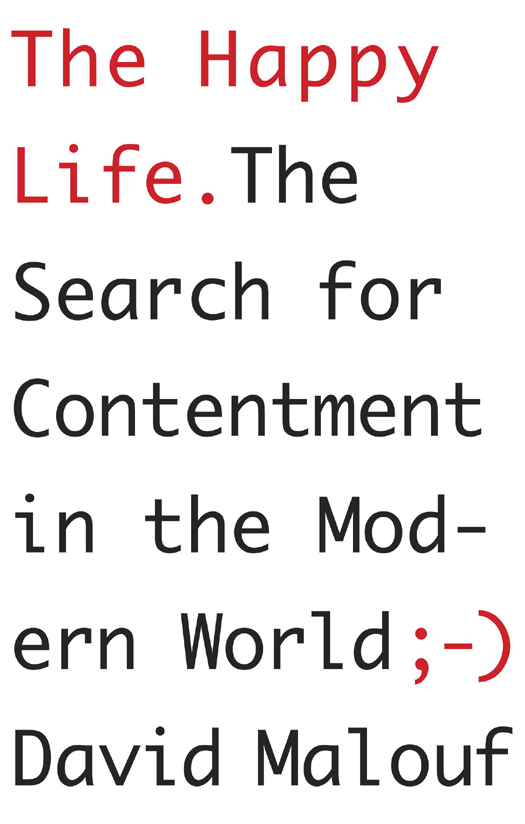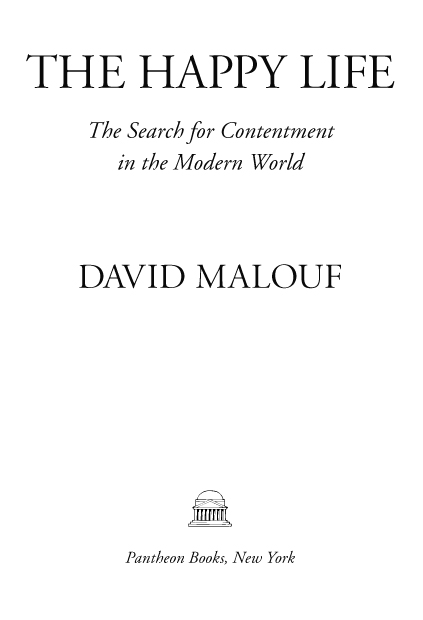Copyright 2011 by David Malouf
All rights reserved. Published in the United States by Pantheon Books, a division of Random House, Inc., New York. This work first appeared in Australia in Quarterly Essay, volume 41, and was subsequently published in book form in the United Kingdom by Chatto & Windus, an imprint of the Random House Group Ltd., London, in 2011.
Pantheon Books and colophon are registered trademarks of Random House, Inc.
Library of Congress Cataloging-in-Publication Data
Malouf, David, [date]
The happy life : the search for contentment in the modern world /
David Malouf.
p. cm.
eISBN: 978-0-307-90782-0
1. Happiness. 2. Contentment. I. Title.
BJ 1481. M 3188 2012 170dc23 2012007180
www.pantheonbooks.com
Jacket design by Emily Mahon
v3.1
Contents
The Character of a Happy Life
H appiness surely is among the simplest of human emotions and the most spontaneous. There can be no one, however miserable the conditions of their daily existence, who has not at some time felt the joy of being alive in the moment; in the love of another, or the closeness of friends or fellow workers; in a babys smile, the satisfaction of a job well done or the first green in a winter furrow; or more simply still, bird-song or the touch of sunlight. But for the vast majority of men and women who have shared our planet in the long course of human history, these can have been no more than moments in a life that was unremittingly harsh.
Think of a medieval farmer as he struggled to keep body and soul together, at the mercy of famine, plague and the periodic arrival over the horizon of mercenaries in search of food or plunder; or women and children in the eighteenth century who spent fifteen hours a day hauling a truck loaded with coal out of a pit; or the African slaves who endured the Middle Passage to the Americas. Think of the millions, soldiers and civilians both, caught up in the wars and social upheavals of the last century, the invasions, evacuations, forced resettlements, the daily struggle to survive the horrors of Auschwitz-Birkenau or Belsen or Mauthausen.
We get some idea of what happy might mean to an inmate of the Soviet Gulags from the list of small mercies at the end of Alexander Solzhenitsyns One Day in the Life of Ivan Denisovich:
Shukhov went off to sleep, and he was completely content. Fate had been kind to him in many ways that day: he hadnt been put in the cells, the gang had not been sent to the Socialist Community Centre, hed fiddled himself an extra bowl of porridge for dinner, the gang-leader had fixed a good percentage, hed been happy building that wall, hed slipped through the search with that bit of blade, hed earned himself something from Tsesar in the evening, hed bought his tobacco. And he hadnt fallen illhad overcome his feelings of illness in the morning.
The day had gone by without a single cloudalmost a happy day.
There were three thousand six hundred and fifty-three days like that in his sentence, from reveille to lights out.
The three extra days were because of the leap years
The truth is that for most of our history only the few, who had the privilege of living free of long hours of hard labour and vulnerability to privation and every form of accident, enjoyed the luxury of considering what happiness of a more settled kind might be: the freedom to cultivate, outside the turmoil of daily living, their garden. Either a real one of orchards and shady walksHoraces Sabine farm or Voltaires Ferneyor the metaphorical one of Marvells green thought in a green shade. Or, within a life that is still engaged with contingency and dailyness, what Montaigne calls the little back-shop, all our own, entirely free, that we must set aside for our self-preservation in even the most crowded household. In this retreat, he tells us,
we should keep up our ordinary converse with ourselves, and so private, that no acquaintance or outside communication may find a place there; there to talk and laugh, as if we had neither wife, nor children, nor worldly goods, retinue or servants; to the end that, should we happen to lose them, it may be no new thing to do without them Since God gives us permission to arrange for our own removal, let us prepare for it; let us pack up our belongings, take leave betimes of the company, and shake off those violent holdfasts that engage us elsewhere and estrange us from ourselves. We must undo those powerful bonds, and from this day forth we may love this and that, but be wedded only to ourselves. That is to say, let the rest be ours, but not joined and glued so firmly to us that it cannot be detached without taking our skin along with it, and tearing away a piece of us. The greatest thing in the world is to know how to belong to yourself.
Montaigne knows only too well, of course, that one needs more than Gods permission to achieve this. It helps if one is also the Seigneur de Montaigne, Chevalier de lordre du Roy et Gentilhomme ordinaire de sa chambre, mayor and governor of Bordeaux, a child of fortune and high privilege; though even then one will be as vulnerable as any other to the ills of the body, and to the hesitations, doubts, irrational hauntings, moods, fears that trouble our fragile consciousness; and of course no one, however protected by royal favour and titles, is safe from Death.
Behind Montaignes very idiosyncratic avocation of the little back-shop of domestic retirement lies a tradition that reaches deep into the classical past: to Seneca, Cicero, Epictetus, and beyond those later writers to Epicurus, Aristotle and Plato in the fourth century BC. This is the tradition we catch a late echo of in one of the most admired of seventeenth-century English poems, Sir Henry Wottons Character of a Happy Life, a version of Horaces Second Epode, Beatus ille quiHappy he who :
How happy is he born or taught
That serveth not anothers will;
Whose armour is his honest thought,
And silly truth his highest skill!
Whose passions not his masters are,
Whose soul is still prepared for death;
Untied unto the world with care
Of princely love or vulgar breath;
Who hath his life from rumours freed,
Whose conscience is his strong retreat;
Whose state can neither flatterers feed,
Nor ruin make accusers great;
Who envieth none whom chance doth raise
Or vice; who never understood
How deepest wounds are given with praise;
Nor rules of state, but rules of good;
Who God doth late and early pray
More of his grace than gifts to lend;
Who entertains the harmless day
With a well-chosen book or friend;
This man is free from servile bands
Of hope to rise, or fear to fall;
Lord of himself, though not of lands;
And having nothing, he hath all.
Wotton, an intimate of John Donne at Oxford and later of the greatest scholar of the age, Isaac Casaubon at Geneva, is in many ways the model of a Renaissance man. The life he celebrates in his poem is his own. It strikes a balance between those opposing possibilities, as the age saw it, of the active and the contemplative life. He spent thirty years in the diplomatic service and had a wit that sometimes got him into trouble; he was responsible for the cheeky definition of a diplomat as an honest man sent to lie abroad for the good of his country. He was for more than twenty years the British ambassador at Venice and in retirement, as Provost of Eton, spent his days, harmlessly as he puts it, in the company of his books and a few close friends, but also fishing in a bend of the Thames known as the Black Potts. His companion on these occasions was Izaak Walton, who later described their days together in his


